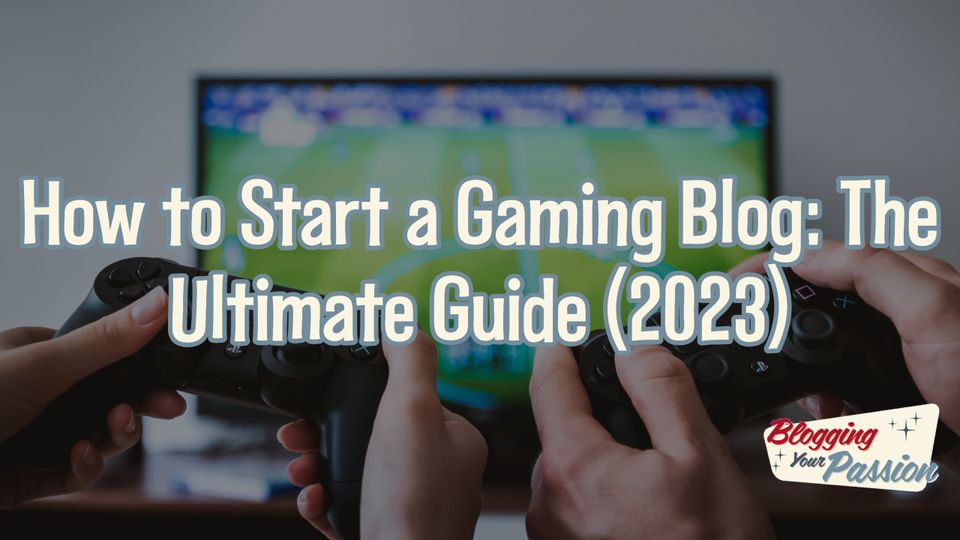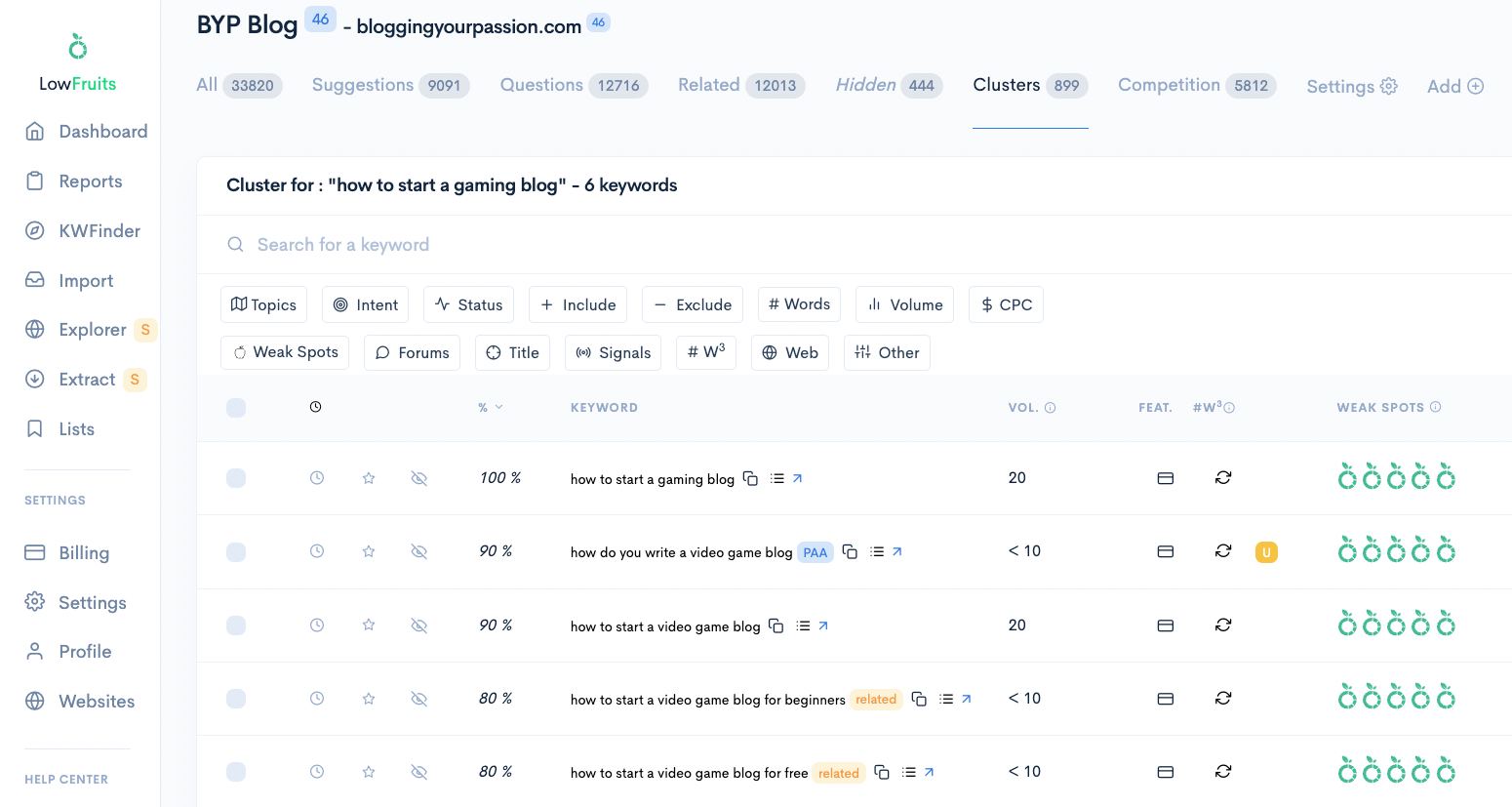How to Start a Gaming Blog: The Ultimate Guide (2024)

Ever wondered, "How to start a gaming blog?"
You're not alone.
The thrilling realm of video gaming is filled with untold tales and grand adventures, ready to be discovered.
If you love video games and have a knack for words, starting your gaming blog could be the perfect venture.
But where do you begin?
In this guide, we'll walk you through how to make a successful gaming blog.
We'll cover five crucial steps: choosing your niche in the gaming industry, creating your website, developing engaging content such as game reviews or upcoming game news, promoting your blog on social media channels, and finally, monetizing it!
Table of Contents (click to expand)
- The Rise of Video Games
- Step 1: Define Your Niche in the Video Gaming Industry
- Step 2: Choose a Blogging Platform Ideal for Gaming Blogs
- Step 3: Create a Content Strategy for Your Video Game Blog
- Step 4: Build Your Social Media Presence
- Step 5: Optimize Your Blog for SEO
- Step 6: Monetize Your Blog with Affiliate Marketing and Advertising
- Step 7: Engage with Your Audience and Build a Community
- How to Avoid Common Mistakes When Starting a Video Game Blog
- FAQs on How to Start a Video Game Blog
- Why should I start a video game blog?
- What should I write about?
- How do I choose a blogging platform?
- How do I promote my video game blog?
- How often should I post?
- How do I make money with a video game blog?
- Final Thoughts: Tips on How to Start a Video Game Blog
The Rise of Video Games

Video games have become popular entertainment, with millions of people playing games on various platforms.
With the growing popularity of video games, there is a need for you to share your insights on the gaming industry
Starting a blog about video games can be an excellent way to share your thoughts and connect with like-minded individuals.
Blogging can be a lucrative venture, with the potential to monetize your blog and build a community.
Do you love to play video games and wish you could do it full-time? Did you grow up playing video games and want to make it your career?
If so, you're in the right place.
Here are the steps of how to start a gaming blog.
Step 1: Define Your Niche in the Video Gaming Industry

Defining your niche and target audience is the foundation of a successful video game blog. It's not enough to simply write about video games in general; you need to find a specific area of interest that sets you apart from other bloggers.
This could be anything from a particular genre of games to a specific platform or even a particular gaming community.
Once you've chosen your niche, it's important to research your target audience and understand their interests. This will help you create content that is relevant and engaging to them.
You can use social media and other online tools to connect with your audience and get feedback on your content.
By focusing on your niche and understanding your audience, you can build a loyal following and establish yourself as an authority in video game blogging.
Here's a list of popular video gaming niches to help get you started:
- Retro Gaming: Focus on games from the '80s and '90s, like the NES, SNES, and Sega Genesis.
- Console Specific: Blog solely about PlayStation, Xbox, or Nintendo games.
- Game Genre Specific: Write about a genre such as RPGs, action-adventure, or strategy games.
- Game Characters: Concentrate on iconic characters from popular video game franchises.
- Pro Gaming Tips: Provide practical tips and reviews to help less experienced gamers to improve their skills.
- Game Developer Focus: Cover games from specific developers like Epic Games or Bethesda Softworks. You can cover the game design document process that ensures every game mechanism, storyline, character details, and development timeline are thoroughly planned.
- Esports: Write about developments in the professional gaming scene, including major tournaments and star players.
- VR Gaming: Develop a niche in virtual reality gaming, including equipment reviews and game recommendations.
- Indie Games: Focus on new and promising indie video games and developers.
- Gaming Equipment: Blog about gaming consoles, controllers, gaming chairs, headphones, or other accessories.
- Mobile Gaming: With the rise of mobile games, focus on popular mobile games and their strategies.
- Retro Console Restoration: Discuss techniques for restoring and maintaining retro gaming systems.
- Gaming Comic Strips: Create and share comic strips or memes about gaming culture.
- PC Vs Console Gaming: Write about the differences, pros, and cons of PC and Console gaming.
- Video Game Music: Discuss and review video games' music and sound design.
- Game Walkthroughs and Guides: Write thorough game walkthroughs, guides, character builds, cheat codes, or strategies.
- Video Game Art: Share and discuss different games' artwork, theme, and design aspects.
- Gaming Events: Cover major gaming events, like E3, Gamescom, or PAX.
- Educational Gaming: Discuss educational games and how they can be used for learning.
- Gaming for Parents: Provide guidance for parents on kid-friendly games and managing screen time.
Step 2: Choose a Blogging Platform Ideal for Gaming Blogs

The blogging platform you choose will have a significant impact on the functionality and design of your blog.
WordPress is popular because it's highly customizable and has a vast library of plugins and themes.
Blogger is a simpler option that's easy to use but has fewer customization options.
Squarespace is a great choice for those who want a visually stunning blog without worrying about coding.
Ghost is my personal favorite blog hosting platform. If you want the fastest, most secure, and simplest blog platform, you should go with Ghost. It has built-in blog hosting, and you'll love the minimalistic design.
Your domain name is the address people will use to find your blog, so choosing one that accurately represents your brand and niche is important.
For example, if you're a food blogger, you might want to include the word "food" in your domain name.
Choosing a domain name that's easy to remember and spell is also important, as this will make it easier for people to find your blog.
Finally, choosing a domain name that's available on social media platforms is crucial. This will make promoting your blog on social media easier and ensure your brand is consistent across all platforms.
Before settling on a domain name, be sure to check its availability on social media sites like Twitter, Facebook, and Instagram.
What do you do if you want to know how to start a video game blog for free? If that's you, consider starting your video game blog using Systeme.io. They offer free hosting and unlimited blog posts.
Step 3: Create a Content Strategy for Your Video Game Blog

When creating a content strategy, it's important to consider the different types of content that will appeal to your audience.
This could include blog content, videos, infographics, and social media posts. You should also think about the tone and style of your content and the frequency of your posts.
One key aspect of a successful content strategy is understanding your audience's interests and needs. This can be achieved through research and analysis of your target market, including their demographics, behaviors, and preferences.
You can increase engagement and build a loyal following by tailoring your content to their interests. In addition to creating compelling content, it's important to promote it effectively.
This could include sharing it on social media, reaching out to influencers in your niche, or using paid advertising to reach a wider audience.
Overall, a well-planned content strategy and editorial calendar can help you stay organized and focused on creating high-quality content that resonates with your audience.
By consistently delivering value and building relationships with your followers, you can establish yourself as an authority in your niche and drive long-term success for your brand or business.
See our guide on how to write a good blog post.
Step 4: Build Your Social Media Presence

Social media has become integral to promoting blogs and building a community around them. With the vast number of social media platforms available, creating a social media strategy that aligns with your blog's goals and objectives is essential.
This strategy should include identifying the most appropriate platforms for your niche and target audience and determining the type of content that resonates with your followers. Engaging with your followers is also crucial in building a loyal audience.
Responding to comments, asking for feedback, and initiating conversations can help foster a sense of community and encourage your followers to share your content with others.
When choosing the right social media platform for your blog, it's important to consider the type of content you'll be sharing.
For example, if you're covering esports events, Twitter may be the best platform for engaging with your audience due to its real-time nature and the prevalence of esports-related conversations.
On the other hand, Instagram may be a better fit if you're sharing more visual content, such as travel photography or fashion tips.
Social media is a powerful tool for promoting your blog and building a community around it. By creating a social media strategy that aligns with your blog's goals and engaging with your followers, you can grow your audience and increase your blog's visibility.
Step 5: Optimize Your Blog for SEO

How do you write a video game blog so people can find it?
That's where SEO comes in.
Search engine optimization (SEO) is a digital marketing strategy that involves optimizing your website or blog to rank higher on search engine results pages (SERPs).
SEO is crucial for improving your blog's visibility and traffic because it helps search engines understand your content and its relevance to users' search queries.
By optimizing your blog for SEO, you can increase the chances of your content appearing on the first page of search results, which can drive more organic traffic to your site.
One of the most important aspects of SEO is keyword research. This involves identifying the keywords and phrases people are searching for in relation to your blog's topic and then strategically using those keywords in your content.
One of my favorite keyword research tools is LowFruits.io. This keyword tool will identify for you the easy-to-rank for keywords in your niche. Then, you write high-quality content for those keywords and hit publish!

By incorporating relevant keywords into your blog posts, you can signal to search engines that your content is relevant to users' search queries. Another important aspect of SEO is optimizing images for search engines.
This involves using descriptive file names and alt tags for your images, which can help search engines understand what the images are about and how they relate to your content.
Creating high-quality backlinks is also an important part of SEO. Backlinks are links from other websites that point to your blog, and they can signal to search engines that your content is authoritative and trustworthy.
To build high-quality backlinks, you can reach out to other bloggers in your niche and ask them to link to your content, or you can create guest posts for other blogs and include links back to your own site.
Overall, understanding SEO basics can help you optimize your blog for better search engine rankings, leading to increased visibility and traffic.
Using relevant keywords, optimizing images, and creating high-quality backlinks can improve your blog's SEO and attract more readers to your site.
More important than SEO is to make sure you create high-quality content that your ideal audience will love.
Want to see my step-by-step blog SEO strategy? Check out our comprehensive article on how to SEO optimize a blog post.
Step 6: Monetize Your Blog with Affiliate Marketing and Advertising

Time to transform those clicks into income.
The first step is understanding the various ways you can monetize your blog.
Affiliate Marketing: This involves promoting products or services from other companies and earning a commission on any sales made through your referral links.
You can join affiliate programs like Amazon Associates, where you'll find countless gaming-related products to promote.
Sponsored Posts are articles or posts written in collaboration with a company looking to advertise their product or service on your platform.
A sponsored post is where a brand pays you to publish a post on your blog that promotes its product or service.
Another option is to offer sponsored reviews, where you receive a product or service for free in exchange for writing a review on your blog
To attract sponsors, ensure your content is high-quality and reaches an engaged audience interested in gaming.
Advertising: You can display ads on your website using platforms such as Google AdSense, which pays based on impressions (views) and clicks received by the ads displayed.
Your choice of monetization strategy should align with the interests of your readership base while maintaining authenticity and trustworthiness.
If choosing affiliate marketing, make sure to only recommend products that you genuinely believe will benefit your readers - this maintains trust between you and them.
Remember that transparency is key in sponsored posts; always disclose when a post has been sponsored to not mislead readers.
If opting for advertising revenue streams like Google AdSense, place ads strategically without disrupting the user experience.
Remember that consistency is key, no matter what route(s) you choose for monetizing. It takes time before seeing significant income from blogging, but patience pays off.
Digital Products: Another way to monetize your video gaming blog is through selling digital products, such as e-books, courses, or digital downloads related to video games. For example, if you have a game design background, you can teach others how to create video games by creating game design courses.
Donations: You can also monetize your blog through donations or crowdfunding. This involves asking your readers to support your blog through donations or crowdfunding campaigns. This can be a great way to generate income while building a community around your blog and passion for video games.
Step 7: Engage with Your Audience and Build a Community

As a video game blogger, your ultimate goal is to create a community of loyal followers who are passionate about your content and actively engage with you.
Building a loyal audience takes time and effort, but it is essential for the long-term success of your blog.
Engaging with your audience is one of the best ways to build trust and foster engagement.
When you respond to comments on your blog and social media platforms, you show your readers that you value their opinions and are interested in what they say.
This can help create a sense of community and encourage readers to return to your blog regularly.
Hosting giveaways or contests is another effective way to engage with your audience. This not only rewards your existing followers but also attracts new ones. Creating exclusive content for subscribers is also a great way to build loyalty.
This can be anything from behind-the-scenes looks at your writing process to early access to new content. By providing value to your subscribers, you can keep them engaged and interested in your offer.
Engaging with your audience is crucial for building a strong and loyal following for your video game blog.
How to Avoid Common Mistakes When Starting a Video Game Blog

Starting a video game blog can be an exciting and rewarding experience, but it's important to avoid common mistakes that can hinder your success.
One of the most common mistakes is failing to define your niche or target audience. Without a clear focus, attracting and retaining readers can be difficult.
Another mistake is not investing enough time and effort into creating high-quality content. Your blog should offer unique insights and perspectives that can't be found elsewhere.
Failing to promote your blog through social media and other channels can limit your reach and impact.
Staying up-to-date with the latest trends and developments in the gaming industry is important to keep your content fresh and relevant.
You can build a successful video game blog that engages and inspires your readers by avoiding these common mistakes.
FAQs on How to Start a Video Game Blog
Why should I start a video game blog?
Starting a video game blog allows you to share your passion for gaming with others. It can also help you improve your writing skills, build a community of like-minded individuals, and potentially earn money through advertising or sponsorships.
What should I write about?
You can write about video games, such as game reviews, news and updates, tips and tricks, and personal experiences. Finding your niche and focusing on a specific area you're passionate about is important.
How do I choose a blogging platform?
Many blogging platforms, such as WordPress, Blogger, and Wix, are available. My personal favorite is Ghost. Consider factors such as ease of use, customization options, and cost when choosing a platform.
How do I promote my video game blog?
Promoting your blog is essential for gaining readership. You can use social media platforms like Twitter and Facebook to share your content, participate in gaming forums and communities, and collaborate with other bloggers.
How often should I post?
Consistency is key when it comes to blogging. Aim to post at least once a week, but don't sacrifice quality for quantity.
How do I make money with a video game blog?
Several ways to monetize your blog include advertising, sponsorships, affiliate marketing, and merchandise selling. However, it's important to prioritize creating quality content before focusing on monetization.
Starting a video game blog can be challenging, but with dedication and passion, it can also be incredibly rewarding.
Final Thoughts: Tips on How to Start a Video Game Blog
Starting a video game blog can be an excellent way to share your passion for gaming while building a community around it.
To achieve long-term success in the industry, it's essential to define your niche clearly, create engaging content, promote effectively on social media platforms, optimize for SEO, monetize effectively through affiliate marketing or advertising, and engage with your audience regularly.
Happy blogging!
